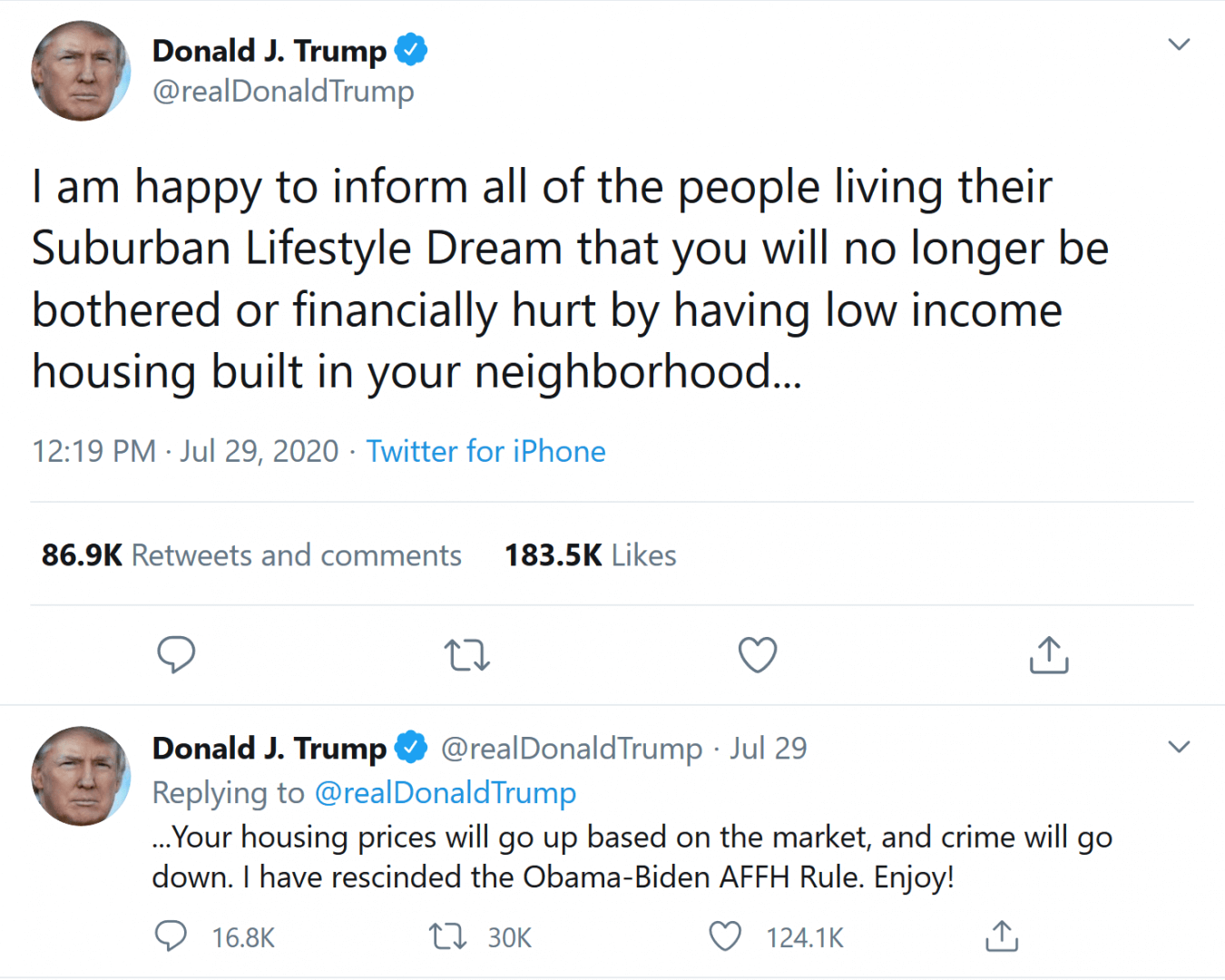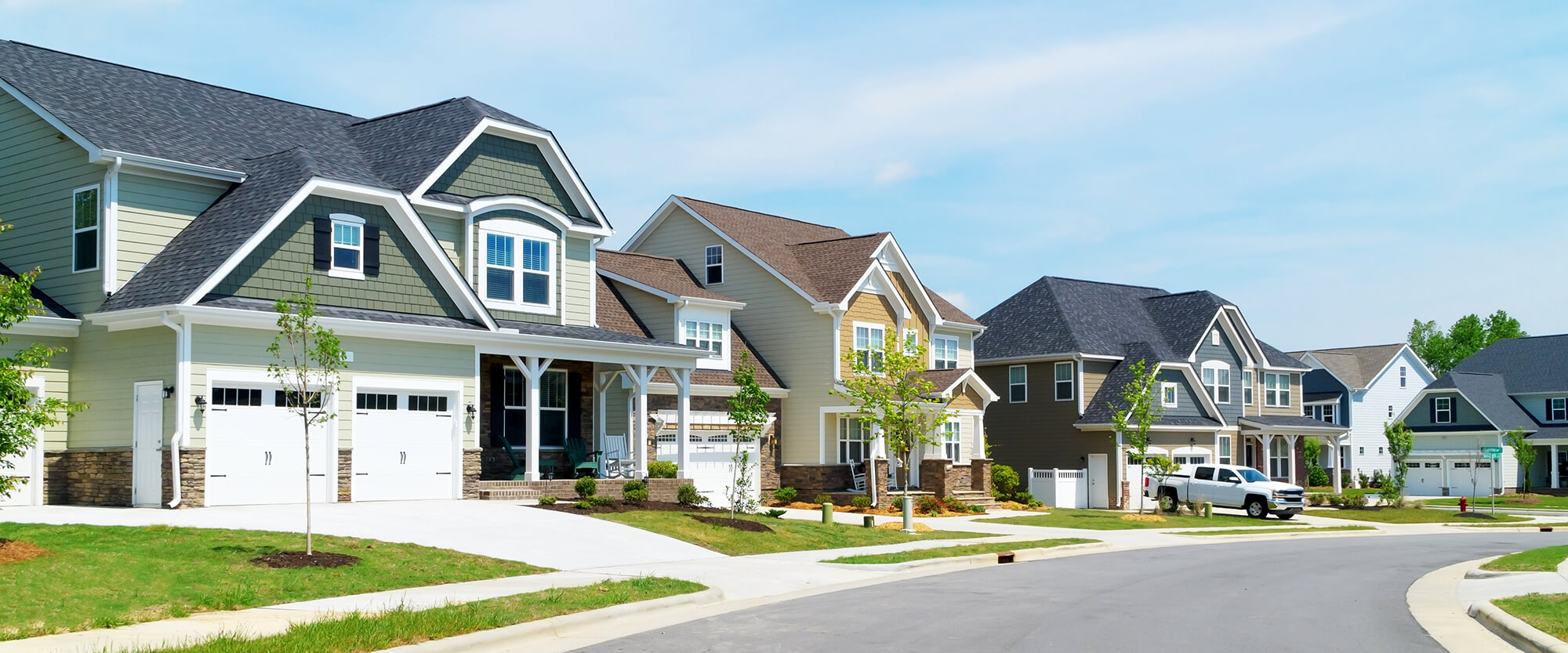In a recent tweet, President Trump proudly announced the revocation of the Obama administration’s Affirmatively Furthering Fair Housing Rule (AFFH), which required local communities to take proactive measures to foster more diverse and inclusive housing.
The administration’s actions not only belittle the decades-long battle to end discriminatory practices and bring more equal opportunity in housing, but also willfully ignore the tremendous affordable housing crisis we face.
President Trump’s tweet, and subsequent comments during a speech in Texas, is an egregious attempt to stoke racial tensions ahead of the general election in November. Trump uses the phrase “low income housing” as a thinly veiled reference to individuals and families belonging to minority groups and communities of color. In his estimation, assuring that white suburbanites will be insulated from “low income housing” is a winning talking point to galvanize his voter base.

The irony here is that Trump’s vision of utopian suburban enclaves that wholly embrace his brand of conservative populism is nearly nonexistent. Though some variation exists, the Pew Research Center reports that, politically, American suburbs are pretty evenly divided between Democrats and Republicans. In fact, the suburbs have proved significant battleground territory in recent years, with voters in these areas contributing to a 2018 democratic takeover of the Virginia state legislature and the ousting of republican governor Matt Bevin in Kentucky.
The suburbs are also more diverse than Trump seems to believe. According to Bloomberg CityLab, “by 2010, in fact, within the 100 largest metropolitan areas in the U.S., there were more Black people living in the suburbs than inside inner cities.” However, large segments of American suburbs still employ deeply rooted practices that discourage housing options for individuals of color, which AFFH sought to ameliorate.
So what exactly is this AFFH rule that drew the ire of the Trump administration? AFFH was put in place in 2015 under the Obama administration, an enforcement mechanism that sought to better achieve the federal mandate to reduce housing segregation outlined in the Civil Rights Act of 1968. Since the conclusion of the Civil War, efforts were successfully made to segregate housing in communities, ensuring that black people had little or no access to housing opportunities that would allow them to build wealth and equity. These deeply entrenched – and now much more nuanced – policies and regulations still define the state of racial equality in American housing to this day. Without the enforcement teeth of AFFH, suburban communities have carte blanche to continue these practices.
Aside from the racial implications of Trump’s language, it also baldly ignores the tremendous need for affordable housing opportunities. In a recent report from the Aspen Institute, researchers identified both an “insufficient supply of new and existing housing” and “demand-side factors” as contributing to unaffordability. Further, a February report from Freddie Mac, suggests 2.3 million additional housing units will be required to make up this shortage. Simply put: the U.S. is not producing enough new housing, and is losing housing stock that is affordable for low- and middle-income households. The impact of the COVID-19 pandemic amplified this overwhelming need, creating an acute shortage of affordable housing.
American suburbs are not insulated from this challenge. Over the past two decades, poverty has increased more greatly in suburban communities than in both urban and rural communities. Additionally, the National Low-Income Housing Coalition’s Out of Reach 2020 report points to the fact that, “a full-time worker with a standard 40-hour work week earning the federal or prevailing state minimum wage cannot afford a two-bedroom rental home at fair market rent in any U.S. county.”
Ensuring that housing is affordable and that housing policies are fair, inclusive and demonstrate equal opportunity benefits all Americans. The dream of homeownership is slipping away from millions of hardworking individuals and families, and we should not be taking actions that further divide our country and further deplete our chances to foster affordable housing opportunity in diverse, healthy and inclusive communities.
